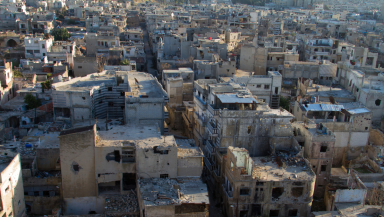
A deadly suicide bombing at a Damascus church on Sunday June 22 has reignited urgent calls for global recognition of the ongoing persecution of Syria’s religious minorities.
According to Kelsey Zorzi, international human-rights lawyer and Director of Advocacy for Global Religious Freedom at ADF International (ADF), the attack is part of a broader pattern of systematic violence - one that the international community continues to dangerously mislabel as “sectarian conflict.”
On Sunday June 22, a suicide bomber entered St Elias Greek Orthodox Church during evening service, opened fire, and then detonated his vest, killing 25 worshippers and injuring more than 60 others. Among the victims were children.
Writing in Spiked, Ms Zorzi described the attack as a chilling reminder that for many religious minorities in Syria, the fall of the Assad regime has not ended their suffering - it has escalated it.
“To be clear, what we are witnessing is the systematic targeting of nearly all religious minorities in Syria - Christians, Druze, Yazidis, Alawites and Shiites - by violent Islamist factions,” Ms Zorzi said.
While no group has claimed responsibility for the bombing, Syrian officials have blamed remnants of ISIS, which, although officially defeated in 2019, “remains alive through sleeper cells,” she stated.
The attack follows a string of recent plots targeting Shiite shrines and other minority landmarks, raising fears that jihadist violence is regaining a foothold amid Syria’s ongoing political instability.
Ms Zorzi warned that the reference to such atrocities as “sectarian violence” by major news outlets and the United Nations obscures the truth: “To call it ‘sectarian violence’ is to imply mutuality where there is none. Minority victims are not aggressors. They are certainly not the ones who need to show ‘restraint.”
She pointed to the rise of violence following the December descent of Bashar al-Assad, which ushered in a new government under President Ahmed al-Sharaa, a former Islamist militant.
Although al-Sharaa’s administration claims to officially uphold religious freedom, rights advocates and Christian groups say protections are failing to materialise.
Syria holds the 18th position among the world’s worst countries for Christian persecution, according to the Open Doors World Watch List.
Its Christian presence—one of the oldest in the world—is rapidly dwindling as families flee violence, intimidation, and economic collapse.
Ms Zorzi noted: “The erasure of Syria’s Christian presence would not only be a humanitarian tragedy, it would also mark the loss of one of the most ancient expressions of the faith ... Without immediate protections, Christianity in Syria risks becoming a memory, its ancient churches left as hollow monuments in a country that once helped carry the faith to the world.”
ISIS waged a campaign of terror against Christians and other minorities across Syria and Iraq between 2014 and 2019. Christians were forced to convert, flee, or face execution.
Though ISIS lost territorial control years ago, Ms Zorzi warned that the same ideology is now reemerging in new guises.
She emphasised: “If the international community refuses to even name the ideology behind these violent attacks, or distinguish the victims from the perpetrators, then Syria’s diversity will vanish. This is not sectarian conflict. This is persecution.”
She also praised the peaceful response of Syrian Christians, who took to the streets in mourning - not to retaliate, but to encourage their community with chants like “Raise your cross high” and “The blood of Christians is precious.”
Groups like Christian Solidarity Worldwide and Open Doors are calling for increased international engagement, including pressure on the Syrian government to address extremism within its ranks and uphold human rights for all citizens.
Trauma counselling and humanitarian support have begun, but many fear it is only a matter of time before another attack strikes.
Ms Zorzi cautioned: “Religious persecution rooted in jihadist ideology does not stay contained.
“It spreads across borders, fills power vacuums and thrives when ignored.
“Religious minorities must be protected from persecution – not only for their sake, but because lasting peace and security begin with defending the most vulnerable.”













